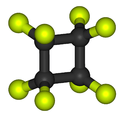Octafluorocyclobutane
| |||
| Names | |||
|---|---|---|---|
| IUPAC name
Octafluorocyclobutane | |||
| Other names
Freon-C-318, perfluorocyclobutane | |||
| Identifiers | |||
3D model (JSmol) |
|||
| ChEBI | |||
| ChEMBL | |||
| ChemSpider | |||
| ECHA InfoCard | 100.003.705 | ||
| EC Number | 204-075-2 | ||
| E number | E946 (glazing agents, ...) | ||
| |||
| |||
| Properties | |||
| C4F8 | |||
| Molar mass | 200.03 g/mol | ||
| Appearance | colourless gas | ||
| Density | 1.637 g/cm3 at −5.8 °C (liquid) 9.97 kg/m3 at −6 °C and 1 atm (gas) | ||
| Melting point | −40.1 °C (−40.2 °F; 233.1 K) | ||
| Boiling point | −5.8 °C (21.6 °F; 267.3 K) | ||
| 0.016 vol/vol (1.013 bar and 20 °C) | |||
| Viscosity | 109e-6 Poise (1.013 bar and 0 °C) | ||
Except where otherwise noted, data are given for materials in their standard state (at 25 °C [77 °F], 100 kPa). | |||
| Infobox references | |||
Octafluorocyclobutane, or perfluorocyclobutane, C4F8, is an organofluorine compound which enjoys several niche applications. It is related to cyclobutane by replacement of all C–H bonds with C–F bonds. Octafluorocyclobutane is produced by the dimerization of tetrafluoroethylene and the reductive coupling of 1,2-dichloro-1,1,2,2-tetrafluoroethane.[1]
Applications
In the production of semiconductor materials and devices, octafluorocyclobutane serves as a deposition gas and etchant.[2] It has also been investigated as a refrigerant in specialised applications, as a replacement for ozone depleting chlorofluorocarbon refrigerants. Exploiting its volatility and chemical inertness, octafluorocyclobutane may be found in some aerosolized foods. It is listed by the Codex Alimentarius under number 946 (E946 for EU). It is investigated as a possible replacement for sulfur hexafluoride as a dielectric gas.
References
- ↑ Siegemund, G.; Schwertfeger, W.; Feiring, A.; Smart, B.; Behr, F.; Vogel, H.; McKusick, B., "Fluorine Compounds, Organic", Ullmann's Encyclopedia of Industrial Chemistry, Weinheim: Wiley-VCH, doi:10.1002/14356007.a11_349
- ↑ "Octafluorocyclobutane (RC318)". Gas Encyclopaedia. Air Liquide. Retrieved May 15, 2013.
Appendix
Its critical point is at 115.3 °C and 2.79 MPa.

